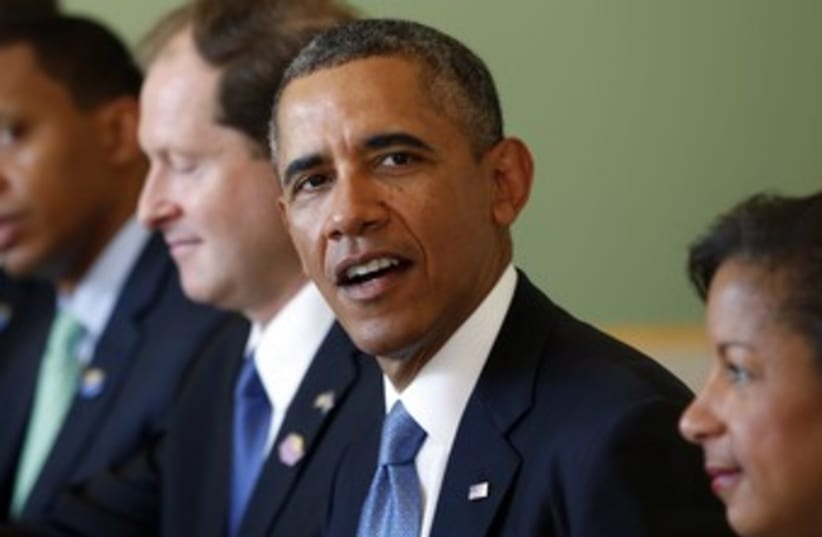In a series of television interviews designed to persuadeCongress and the American public of the need for intervention,Obama said he would pause any military action if Syria wouldrelinquish control of its chemical weapons arsenal.
Congress sought to buy more time to explore Russia's offer.Democratic Senate leader Harry Reid pushed back a Wednesday testvote on authorizing military strikes to possibly later in theweek.
"I don't think we need to see how fast we can do this. Wehave to see how well we can do this," Reid told his colleagues.
The surprise diplomatic course opened up after USSecretary of State John Kerry made an unscripted comment earlieron Monday. Kerry suggested in London, in response to areporter's question, that Syrian President Bashar Assad couldavoid a military strike by surrendering his chemical arsenal.
Russia pounced on the comment, and Syria also said it wasopen to a proposal to put the weapons under internationalcontrol.
Obama said he prefers a diplomatic solution in Syria, but isstill skeptical.
"This could potentially be a significant breakthrough,"Obama told NBC News in an interview. "But we have to beskeptical because this is not how we've seen them operate overthe last couple of years."
Administration officials also said the proposal would notderail efforts to get congressional authorization for strikes,saying it was the threat of strikes that motivated Russia'soffer.
Obama faces an uphill struggle to win approval on militaryintervention from Congress, where a majority of lawmakers arestill undecided on whether to use military force to punish Syriafor an Aug. 21 chemical weapons attack on civilians.
'WOULDN'T SAY I'M CONFIDENT'
"I wouldn't say I'm confident" of winning approval, Obamatold NBC, but he plans an intensified lobbying blitz for supportover the next few days.
In addition to the television interviews, Obama was due tovisit the Capitol on Tuesday to make his case to lawmakers fromboth parties before making a televised address to the nationfrom the White House in the evening.
Some lawmakers reacted positively to the Russian plan.Republicans John McCain and Lindsey Graham, leading supportersof the strikes, said the Russian proposal should make it easierto win support in Congress.
Senator Dianne Feinstein, Democratic chairwoman of theSenate Intelligence Committee, said Russia could be "mosteffective" in encouraging Assad to place his chemical arsenalunder UN control.
"I do think that the Russians are serious. I met with theRussian ambassador earlier today and believe that they areserious in putting this together and that it is a plan thatcould solve the problem," she said.
Former Secretary of State Hillary Clinton, a potentialpresidential candidate in 2016, waded into the debate, endorsingObama's drive for Congress to approve military action and sayingSyria's surrender of chemical weapons would be an "importantstep."
Hundreds of House members attended a Syria briefing late onMonday by Kerry and Defense Secretary Chuck Hagel. Many membersexpressed interest in the Russia proposal, along with a dose ofskepticism.
"We should very quickly and clearly find out if this thingis real," said Representative Eliot Engel, the top Democrat onthe House Foreign Affairs Committee. "I'm dubious, becauseRussia's been a very bad player on this, blocking everythingwe've tried to do in the United Nations."
The Russian proposal could make it harder for theadministration to build political momentum for military strikesby giving an excuse to some lawmakers to say they prefer to letthe diplomatic process play out.
'THROWS A WRENCH'
"It basically throws a bit of a wrench into theadministration's approach," said Robert Danin, a Middle Eastexpert at the Council on Foreign Relations. "But it may be awelcome wrench."
Some members of Congress said Obama has lost support for astrike over the last week and polls indicated Americans, wearyafter wars in Afghanistan and Iraq, strongly opposed militaryaction.
A Reuters/Ipsos poll released on Monday showed opposition toa US military strike was increasing. The poll, taken Thursdaythrough Monday, indicated 63 percent of Americans opposeintervention, up from 53 percent in a survey ending August 30.
Mike Rogers, Republican chairman of the House IntelligenceCommittee and a supporter of strikes, said on Monday that Obamahad "fumbled" the message on Syria and faced a critical moment.
"Mr. President, lay out the case. It's an important case forthe future national security of this country. You're right onyour decision, now show Americans why you believe it's right,"Rogers said on MSNBC. "And when he does that, I think we'regoing to get votes."
Assad, in an interview with CBS television, denied there wasany evidence linking his government to the attack and warnedthat if there were strikes against Syria, the United Statesshould expect reprisals.
Susan Rice, making her first major speech since taking overas Obama's national security adviser, said the United Statescannot allow countries such as North Korea and Iran to thinkWashington would not react to a chemical weapons attack."We cannot allow terrorists bent on destruction, or anuclear North Korea, or an aspiring nuclear Iran, to believe forone minute that we are shying away from our determination toback up our longstanding warnings," she said at the New AmericaFoundation think tank.Crisis in Syria - full JPost.com coverage
